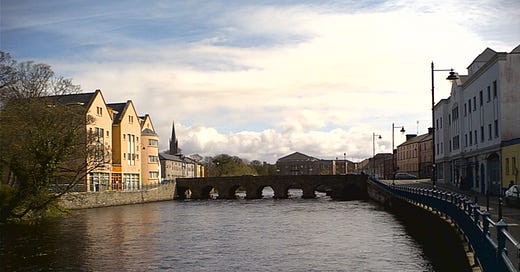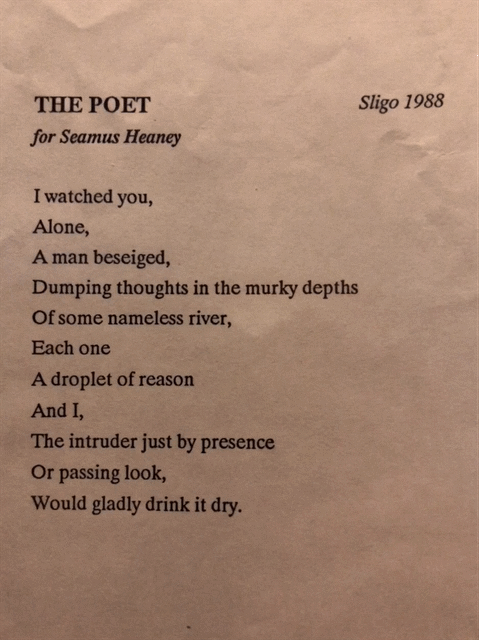DYING OF THE DREUTH
MEETING SEAMUS HEANEY
Ah, The Yeats Society, off into the depths of Sligo again, on a pilgrimage to meet there with your man Seamus, that rare Maestro of the Quill, whose words stir hearts, and pluck on spines, his deep voice traipsing poems off the tongue to make minds go still. A hero of mine, born and bred in County Derry, and I next door in Tyrone. I am in awe, and pine to hear him read from Door In The Dark, The Haw Lantern or Sweeney Astray. I make my way to a poetry workshop there, with my good friends Terry, now passed away, and Christine who disappeared abroad, I believe. We made up a clique in our day, wanting only to revere our idols, I would say, mad about Yeats and Joyce, Wilde, Deane, Tobin and Mahon, Flann O’Brien, Alice Milligan and a hundred others all weaned on Irish soil. We were determined to spoil ourselves and meet the new Wizard of Words. A wise smile and a big welcome at last, we felt we are in a ceilidh, waiting for stories to arise from an ancient past, everyone a spinner of spellbound phrases and stanzas, many from different lands. He coached and taught and listened for hours, and for that momentous time was completely ours. He made us laugh until there were tears in our eyes and read us laments that did likewise. Tornadoes of thoughts ripped through our brains, dissecting conventional ways. He was not just a poet, but a Muse. I had written a poem called Mullaghmore and read it aloud. He gave me a thumbs up and requested I recite it again. I was on cloud nine, does anyone on earth know where that is? A very elderly shy lady was there, dressed in a brown raincoat which she never removed, her hand-written papers in a knitted shopping bag. Her hair was spun silver in a bun. She was quiet and serene. On the second last day she was at last persuaded to read her poems.
“Have no fear,” says he, “we started as strangers but you are among friends here.”
She took courage and read words that danced into our heads, wrapped up our minds and took us clean away. Seamus Heaney got up and gently steered her to his vacated chair, and we all knew why. He taught from her seat for the rest of that day.
Later at dusk, I saw him standing alone on a bridge in the town, looking into a river. My heart did a double-take flip, but I did not approach. His solitude was his alone.
I walked back to the hotel and wrote a short poem:
I found out later it was the River Garavogue (An Gharbhóg), one of the shortest in Ireland, flowing from Lough Gill through the town to the Atlantic.
The last day came, sad to say, and we worked hard, gleaning every bit of wisdom from this incredible man. I realised that he hadn’t had a drink for most of that time.
“May I get you a tea or coffee?” I asked.
“I’m dying of the dreuth,” he answered with a big sigh of relief, “Coffee, if it’s no bother, and… thank you, Dwina,” he said, looking me straight in the eye. He remembered my name! I remembered the smile in his eyes. It gave my spirits yet another rise. I knew the Ulster phrase and he knew that I knew it too.
I ran into the little kitchen to make him, not one, but two cups of coffee, then wanted to present them to him as befits a King. I found a lid on an empty biscuit tin, and dressed it up, quickly double folding a napkin and cutting designs around and all through it with scissors I found. Unfolded, it looked like a lace doily, then underneath, I slipped the poem I had kept in my pocket. I thought to myself:
‘God, I’m a fan!’
He drank the first cup then signed The Haw Lantern to me:
‘Writing our names there’ … Seamus Heaney.
I never knew if he found my poem or not, for I fled shortly after, finding the cut bits of doily in my pocket, not wanting to leave a mess back there. I cherished the book but when I returned to England it disappeared or was stolen, causing much distress. Four Courts Press in Dublin got him to kindly sign another with the same words, and he did. to my surprise. It was a grand week indeed in 1988 in the presence of Seamus and one I will never forget.
It saddened me greatly to hear of his demise in 2013, but it warmed my heart when I heard his son Michael announce that a few minutes before his father left the body, he sent a text message, his last words, to his wife Marie, in Latin: “Noli Timere”….
‘Do not be afraid.’
Dwina ***
River Garavogue in Sligo.






I love this. Such a powerful memory of such a brilliant-minded man. Now we need to see the drawing you made of him!
This is so nice!
I just ordered in amazon Finders Keepers: Selected Prose 1971-2001,
It will be here soon!!!!
Btw, I find the "Ulysses" by James Joyce tough to follow and not because I am not Irish or because English is not my first language. But, I have enjoyed "Waiting for Godot" in YouTube!
If I hear someone say The Ulysses is my favorite book...I would pay attention to who is saying it...at least here in the USA!